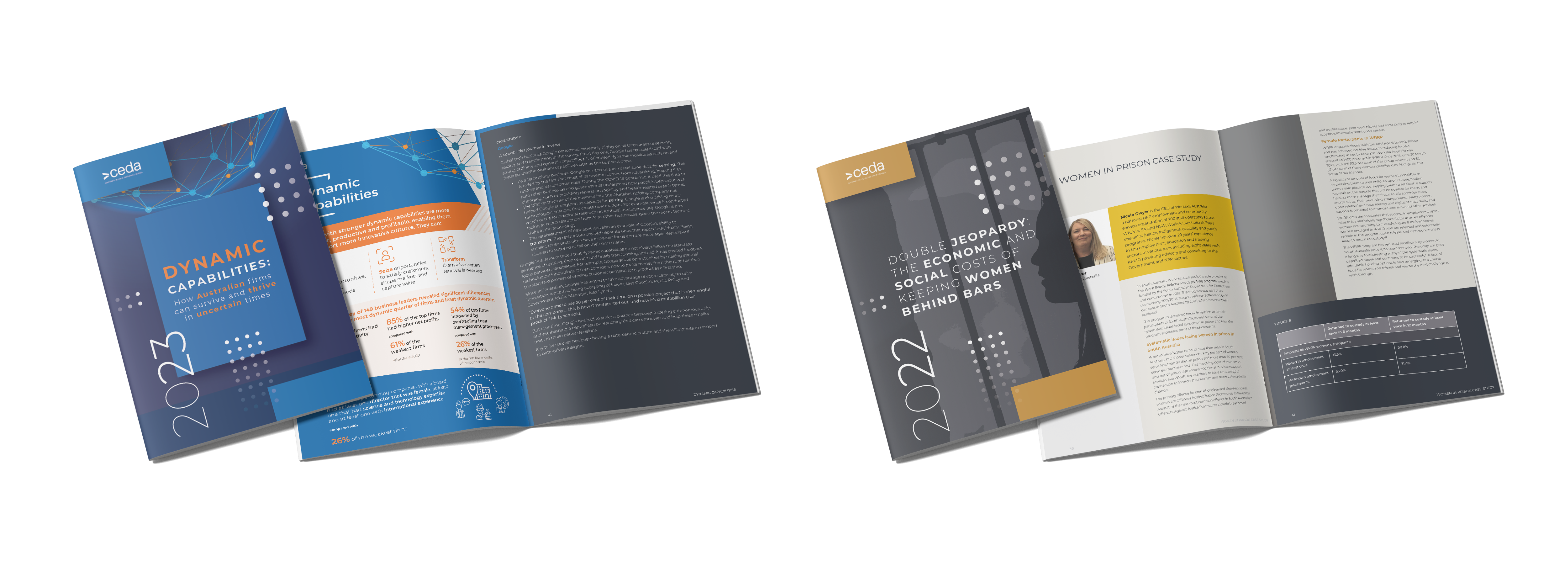Explore our Climate and Energy Hub
Members and CEDA research
CEDA members can contribute to targeted policy discussion throughout all stages of our research. Members are invited to attend our roundtables and working groups, provide valuable case studies to support our reports and advise as part of our Member Advisory Committees on CEDA's core research areas.
Our recent reports...
How can members engage with CEDA research?
Examples of member case studies

Dynamic capabilities | Google case study
From day one, Google has recruited staff with strong ordinary and dynamic capabilities. It prioritised dynamic individuals early on and fostered specific ordinary capabilities later as the business grew. Google has demonstrated that dynamic capabilities do not always follow the standard sequence of sensing, then seizing and finally transforming. Instead, it has created feedback loops between capabilities. For example, Google seizes opportunities by making internal technological innovations. It then considers how to make money from them, rather than the standard process of sensing customer demand for a product as a first step.
Justice | Workskil case study
In South Australia, Workskil Australia is the sole provider of the Work Ready, Release Ready (WRRR) program which is funded by the South Australian Department for Corrections and commenced in 2018. This program was part of an overarching ‘10by20’ strategy to reduce reoffending by 10 per cent in South Australia by 2020, which has now been achieved. The WRRR program has reduced recidivism by women in South Australia since it has commenced. The program goes a long way to addressing many systematic issues and continues to be successful. A lack of affordable housing options is now emerging as a critical issue for women on release and will be the next challenge to work through.

Mental health and the workplace | McConnell Dowell case study
WorkSafe Victoria’s “Integrated Approach to Wellness” is an example of a successful state level mental health improvement program. The program was developed in response to the elevated levels of depression, anxiety and stress experienced by white collar professionals in the infrastructure construction industry. The project was developed by leadership and culture consultant Lysander and piloted at the Mordialloc Bypass freeway project with employees from construction companies McConnell Dowell and Decmil. The program was considered successful and is being rolled out across the industry. For example, McConnell Dowell reported that their client Major Road Projects Victoria has continued to support the program’s rollout across their road infrastructure projects.
Powering the Transition | Hastings Deering case study
The skills required in key energy-using industries such as transport, construction and mining mobile-plant equipment will change as electrification becomes widespread. Hastings Deering is at the forefront of these changes, as a firm that supplies and services mining and construction equipment. As part of Sime Darby Berhad, it is targeting a 30 per cent reduction in scope 1 and 2 emissions by 2030. It has begun transitioning towards battery-electric mobile-plant equipment, through selling and servicing diesel/electric hybrid machines. Current regulations reduce opportunities to develop an appropriate workforce. Hastings Deering has a large workforce of qualified mobile-plant technicians trained to work on diesel-powered machines. Across the industry, they face licensing limitations that can prevent upskilling to work on electrified mobile plant.






